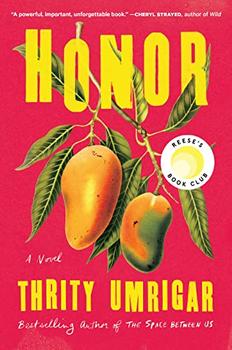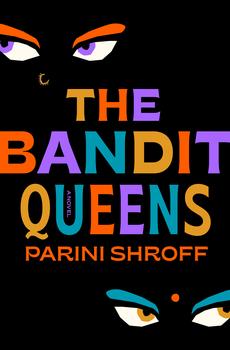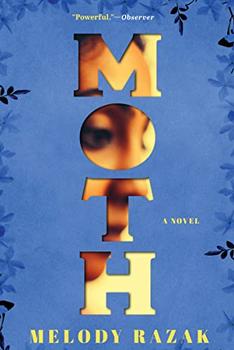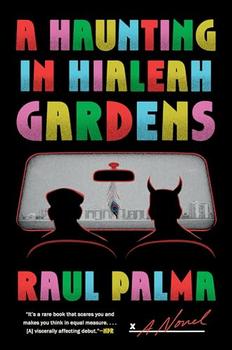Summary | Excerpt | Reading Guide | Discuss | Reviews | Beyond the book | Read-Alikes | Genres & Themes | Author Bio

A Reese's Book Club Pick! In this riveting and immersive novel, bestselling author Thrity Umrigar tells the story of two couples and the sometimes dangerous and heartbreaking challenges of love across a cultural divide.
Indian American journalist Smita has returned to India to cover a story, but reluctantly: long ago she and her family left the country with no intention of ever coming back. As she follows the case of Meena—a Hindu woman attacked by members of her own village and her own family for marrying a Muslim man—Smita comes face to face with a society where tradition carries more weight than one's own heart, and a story that threatens to unearth the painful secrets of Smita's own past. While Meena's fate hangs in the balance, Smita tries in every way she can to right the scales. She also finds herself increasingly drawn to Mohan, an Indian man she meets while on assignment. But the dual love stories of Honor are as different as the cultures of Meena and Smita themselves: Smita realizes she has the freedom to enter into a casual affair, knowing she can decide later how much it means to her.
In this tender and evocative novel about love, hope, familial devotion, betrayal, and sacrifice, Thrity Umrigar shows us two courageous women trying to navigate how to be true to their homelands and themselves at the same time.
CHAPTER FIVE
Smita's heart began to flutter, and her hands turned clammy within moments of strolling down the Causeway . Her anxiety wasn't caused by the vendors at the roadside stalls who begged her to examine their leather purses and silver jewelry and wooden statues. It wasn't because she heard her own distant laughter in the laughter coming from the schoolgirls walking ahead of her, saw her former self in the way they half skipped, half walked down the sidewalk. It wasn't because she passed Metro Shoes and remembered going there with Mummy at the start of each school year. It wasn't because she passed shops selling schoolbags and remembered Papa buying new backpacks for her and Rohit at the start of each school year. It wasn't even because she walked past the Olympia Coffee House and remembered the egg bhurji breakfast that Papa used to sometimes treat her to on Saturdays.
Her hands went clammy because she was close to the one street that she'd hoped to avoid forever.
Spencer Road. ...
Here are some of the comments posted about Honor.
You can see the full discussion here.
Did you recognize any common touchpoints across the cultures of India and America? What aspects reminded you of life in America?
Many people have posted excellent points that contrast India and America and sadly our country is becoming more controlling in many ways including civil liberties, book banning, voter suppression on the other hand we have more support groups while ... - carriem
Honor killings are a fact of life in many parts of the world. What do you think it will take to change this cultural practice?
It is so sad to think that honor killings could remain a part of life as we know it, but that should not prevent world leaders and others from attempting to educate all people to the inhumanity of this behavior. Human dignity should somehow prevail ... - cece
How do their cultures inform Smita and Meena's relationships? If you are in a committed relationship, how do you think it would have been affected if it had begun in a different culture?
In my neighborhood where I grew up it was difficult and caused family trauma for a Protestant to marry a Catholic. But it didn’t get someone burned alive. We have come a long ways in 60 years.
The consequences were just so much more ... - gingiew
How is Meena's India different from Smita's? What explains the differences?
Meena's life is one of abject poverty. She is uneducated and her only prospect for work is in a factory. Smita comes from an educated family. Her father is a professor of Hindu studies and is proud of Smita's accomplishments. Meena'... - bonnieb
Meena relates her story to us directly, in the first person. Why do you think the author chose this point of view?
I think Meena is more realistic in the first person. Her innocence and love ring so true. - kathleenb
It is hard subject matter to read, but Umrigar does it in such a way that you feel the injustice, the hate, the pain, but can continue reading. She is a master at balancing the horror of what mankind is capable of, while also showing the love, loyalty, and compassion that lives within so many (Kate S). I have read many of Thrity Umrigar's earlier works and found them all to be thoughtful and rich, and Honor is no exception (Nancy L). This was an easy book to rate: five stars, no hesitation. But the author is Thrity Umrigar, who never disappoints (Joan V)...continued
Full Review
 (716 words)
(716 words)
(Reviewed by First Impressions Reviewers).
 Reese Witherspoon
Complex and unfiltered ... Powerful story about family, devotion, and cultural truths.
Reese Witherspoon
Complex and unfiltered ... Powerful story about family, devotion, and cultural truths.At the time of the partition in 1947, what was once the British colony of India was split, separating the predominantly Hindu Dominion of India (modern-day Republic of India) from the predominantly Muslim Dominion of Pakistan (modern-day Pakistan and Bangladesh). Prime Minister Jawaharlal Nehru envisaged India as a secular socialist democratic republic. Sadly, his vision did not endure, and anti-Muslim sentiment and violence have been a constant, increasingly so since the early 1990s. This issue is captured vividly in Thrity Umrigar's novel Honor, which centers around a Hindu woman who is suing her brothers for murdering her Muslim husband.
India is constitutionally secular, and the population is roughly 84% Hindu and 14% Muslim. ...

If you liked Honor, try these:

by Parini Shroff
Published 2024
A young Indian woman finds the false rumors that she killed her husband surprisingly useful—until other women in the village start asking for her help getting rid of their own husbands—in this razor-sharp debut.

by Melody Razak
Published 2023
Melody Razak makes her literary debut with this internationally-acclaimed saga of one Indian family's trials through the tumultuous partition - the 1947 split of Pakistan from India - exploring its impact on women, what it means to be "othered" in one's own society, and the redemptive power of family.




Great literature cannot grow from a neglected or impoverished soil...
Click Here to find out who said this, as well as discovering other famous literary quotes!